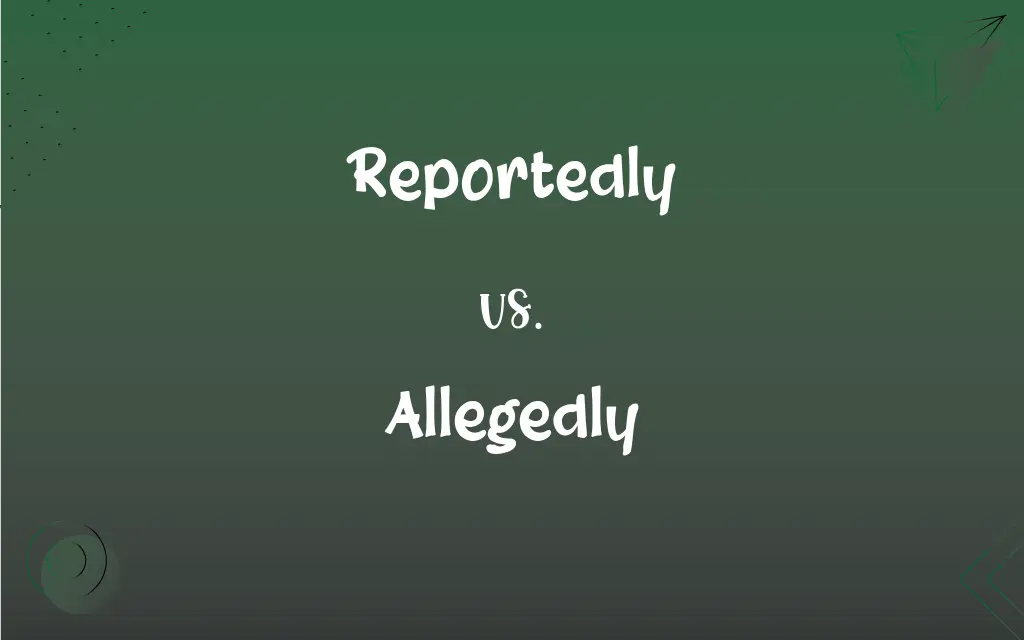Reportedly vs. Allegedly: What's the Difference?
By Harlon Moss & Aimie Carlson || Updated on May 30, 2024
"Reportedly" means something has been stated by sources or reports, whereas "allegedly" implies a claim has been made without conclusive evidence.

Key Differences
"Reportedly" is used to indicate that something has been stated by one or more sources. It suggests that there is some level of credibility or documentation behind the statement, even if it's not independently verified. For example, "The company is reportedly planning to expand next year." "Allegedly," on the other hand, is used to describe a claim that has been made but not yet proven. It often carries a connotation of doubt or pending verification. For instance, "He allegedly stole the money from the safe," implies that the accusation has been made but the truth of the matter is still uncertain.
"Reportedly" often conveys information that is expected to be reliable or from reputable sources, even if it's not confirmed. This term is frequently used in journalism to convey what has been communicated through official channels or credible sources. "The mayor is reportedly considering a run for governor." In contrast, "allegedly" is used when referring to claims or accusations that are not yet verified or proven. It maintains a neutral stance, not taking sides on the truth of the statement. "She allegedly committed fraud," does not imply guilt, only that the accusation exists.
When using "reportedly," there is usually an implication of trust in the sources of information. It suggests a level of investigation or reporting has taken place, providing a layer of credibility. For example, "The movie will reportedly be released next summer." "Allegedly" emphasizes the unverified nature of the information. It is a term that is often used in legal contexts or media reporting to ensure neutrality and avoid libel. For instance, "The official allegedly accepted bribes," indicates the seriousness of the accusation without confirming its truth.
Comparison Chart
Meaning
Stated by sources or reports
Claimed without conclusive evidence
Connotation
Implies some credibility
Implies doubt or pending verification
ADVERTISEMENT
Common Usage
Journalism, credible reports
Legal contexts, media reporting
Source Trust
Usually trustworthy sources
Neutral stance on source credibility
Example Sentence
"She is reportedly moving abroad."
"He allegedly broke into the house."
Reportedly and Allegedly Definitions
Reportedly
Indicated by documents or witnesses.
She is reportedly the new CEO.
Allegedly
Claimed without conclusive evidence.
He allegedly embezzled funds from the company.
ADVERTISEMENT
Reportedly
Claimed in a documented manner.
The event was reportedly attended by thousands.
Allegedly
Said to have taken place, but unproven.
The witness allegedly saw the suspect.
Reportedly
Published in a news outlet.
The artist is reportedly releasing a new album.
Allegedly
According to accusations.
She allegedly falsified the documents.
Reportedly
Stated by sources or reports.
The policy change is reportedly effective next month.
Allegedly
Indicated in unverified claims.
He allegedly violated the contract terms.
Reportedly
According to information received.
They reportedly have reached an agreement.
Allegedly
Reported with suspicion.
The politician allegedly accepted illegal donations.
Reportedly
By report; supposedly.
Allegedly
Represented as existing or as being as described but not so proved; supposed
An alleged conspiracy.
An alleged traitor.
An alleged victim of a crime.
Reportedly
According to reports or rumors; supposedly.
Allegedly
According to someone's allegation.
The suspect was allegedly involved in the robbery, but his alibi placed him in another state at the time.
Reportedly
According to reports or other information;
She was reportedly his mistress for many years
Allegedly
According to someone's conspicuous impressions (which could subsequently be alleged).
The game is allegedly exciting.
Allegedly
According to what has been alleged;
He was on trial for allegedly murdering his wife
FAQs
What does "allegedly" mean?
"Allegedly" implies a claim has been made without conclusive evidence.
Can "reportedly" be used in legal contexts?
Yes, "reportedly" can be used in legal contexts, but it is more common in journalism.
What does "reportedly" mean?
"Reportedly" means something has been stated by sources or reports, often implying credibility.
Is "reportedly" used in everyday conversation?
Yes, "reportedly" can be used in everyday conversation, especially when referring to news or third-party information.
Can "allegedly" be used to protect from defamation?
Yes, using "allegedly" can help avoid making definitive statements that could be defamatory.
Does "reportedly" suggest trust in the sources?
Yes, "reportedly" usually suggests a level of trust in the sources.
Is "allegedly" more formal than "reportedly"?
"Allegedly" can be seen as more formal, particularly in legal or serious contexts.
Does "allegedly" imply doubt?
Yes, "allegedly" implies there is doubt or pending verification.
Is "allegedly" used in news reporting?
Yes, "allegedly" is frequently used in news reporting to describe unverified claims.
Does "allegedly" take sides on the truth of a statement?
No, "allegedly" maintains a neutral stance on the truth.
Is "reportedly" based on firsthand information?
Not necessarily, it often refers to secondhand reports from credible sources.
Can "reportedly" refer to unofficial sources?
It can, but it typically refers to sources that are considered credible or trustworthy.
Can "reportedly" imply that something is confirmed?
No, "reportedly" indicates that something has been stated but not necessarily confirmed.
Does "allegedly" imply the speaker's belief?
No, "allegedly" does not imply the speaker's belief, only that the claim exists.
Does "allegedly" always refer to negative actions?
Not always, but it is commonly used in the context of accusations or suspicions.
Does "reportedly" suggest ongoing investigation?
It can imply that information is still being confirmed or investigated.
Is "reportedly" similar to "apparently"?
They can be similar, but "reportedly" often implies a source, whereas "apparently" implies visible evidence or appearance.
Is "allegedly" neutral in tone?
Yes, "allegedly" is neutral and does not imply judgment.
Can "reportedly" be used in academic writing?
Yes, "reportedly" can be used in academic writing to reference sources.
Does "allegedly" indicate proof?
No, "allegedly" indicates a lack of proof and the need for verification.
About Author
Written by
Harlon MossHarlon is a seasoned quality moderator and accomplished content writer for Difference Wiki. An alumnus of the prestigious University of California, he earned his degree in Computer Science. Leveraging his academic background, Harlon brings a meticulous and informed perspective to his work, ensuring content accuracy and excellence.
Co-written by
Aimie CarlsonAimie Carlson, holding a master's degree in English literature, is a fervent English language enthusiast. She lends her writing talents to Difference Wiki, a prominent website that specializes in comparisons, offering readers insightful analyses that both captivate and inform.































































